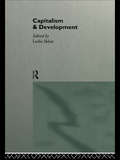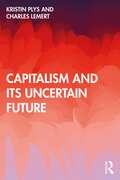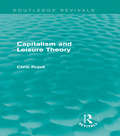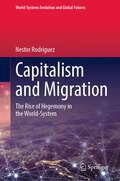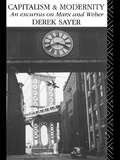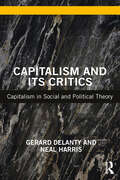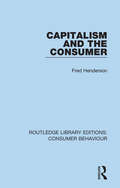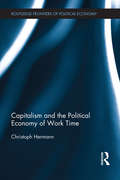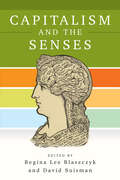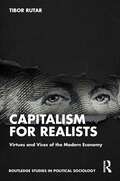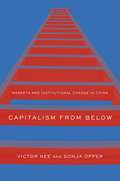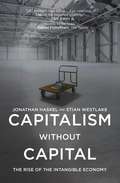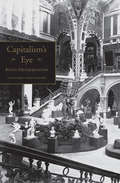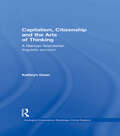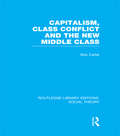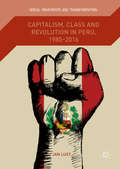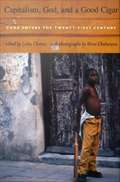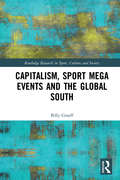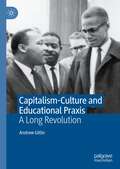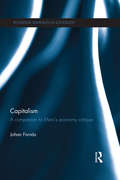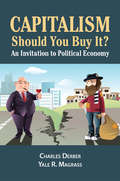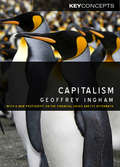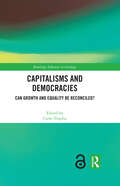- Table View
- List View
Capitalism and Development
by Leslie SklairThis collection draws together a distinguished group of authors to explore how capitalism contributes to the development and underdevelopment of the Third World. It provides a superb overview of key concepts such as "capitalism", "development","modernization" and "dependency".
Capitalism and Its Uncertain Future
by Charles Lemert Kristin PlysFor decades, Charles Lemert has been the leading voice in social theory. In Capitalism and its Uncertain Future he teams up with one of the most creative emerging social theorists, Kristin Plys, to examine how social theory imagines capitalism. This engaging and innovative book provides new perspectives on well known theorists from Adam Smith, and Frantz Fanon, to Gilles Deleuze, while also introducing readers to lesser known theorists such as Lucia Sanchez Saornil, Mohammad Ali El Hammi, and many more. The book examines theories of capitalism from four perspectives: macro-historical theories of the origins of capitalism; postcolonial theories of capitalism that situate capitalism as seen from the Global South; theories of capitalism from the perspective of labor; and prospective theories of capitalism’s uncertain future. This provocative and ambitious, yet accessible, perspective on theories of capitalism will be of interest to anyone who wants to explore where we’ve been and where we’re headed.
Capitalism and Leisure Theory (Social Science Paperback Ser. #No. 291)
by Chris RojekFirst published in 1985, this title explores theories of leisure in a capitalist society. Basing his argument on a refutation of the conventional association of leisure with freedom and free time, Chris Rojek examines the four main structural characteristics of modern leisure practice: privatisation, individuation, commercialisation and pacification. The writings of Marx, Durkheim, Weber, and Freud are used to locate the question of leisure in more mainstream social theory. This interesting reissue will be of particular value to students of sociology and leisure studies, and those with an interest in the relationship between leisure and power.
Capitalism and Migration: The Rise of Hegemony in the World-System (World-Systems Evolution and Global Futures)
by Nestor RodriguezThis book explores the role of capital and labor migration in the expansion of the capitalist world-system. It presents comprehensive case studies on various historical periods of hegemony recognized by world-system theory: the Dutch hegemony (1625-1675), British hegemony (1815-1873), and US hegemony (1945-1970). Moreover, the book identifies an earlier period of economic dominance in Western Europe when merchant-bankers from Florence dominated the regional wool trade in the early thirteenth century. In these four intervals of dominance, i.e., from the medieval period to the late twentieth century, capital and labor migration formed the basis of capitalist development in the hegemonic core states as well as in peripheral regions under their economic and political influence. In turn, the book analyzes the migration patterns associated with the rise of hegemony from the perspectives of class relations between employers and workers, technological advances at the workplace, economic cycles, and state policies on labor migration. It concludes with a projection that heightened migration will continue to characterize the capitalist world system, especially as many poor and displaced populations in peripheral regions resort to migration for survival. Accordingly, it appeals to scholars in the fields of politics, sociology, history, anthropology, and economics who are interested in globalization and world-system analysis.
Capitalism and Modernity: An Excursus on Marx and Weber
by Derek SayerFirst Published in 2004. Routledge is an imprint of Taylor & Francis, an informa company.
Capitalism and its Critics: Capitalism in Social and Political Theory
by Gerard Delanty Neal HarrisCapitalism and its Critics offers an accessible account of major theories of capitalism from the industrial revolution to the present day. The book provides a comprehensive account of the economic and social thought of key theorists from Adam Smith and Karl Marx to David Harvey and Thomas Piketty. Capitalism has long been the subject of passionate debate, and today such contestations are perhaps more timely than ever. For its advocates, capitalism brings democracy and freedom and is the cornerstone of modernity and of progress. For its critics, capitalism is based on the exploitation of labour and is responsible for the destruction of the environment as well as colonialism. Whether capitalism survives the century, or whether an alternative social system emerges, may very well determine the fate of humanity. Capitalism and its Critics gives a comprehensive critical analysis of the most important theorists of capitalism, including Adam Smith, Karl Marx, Max Weber, Joseph Schumpeter, Karl Polanyi, F.A. Hayek, J.M. Keynes, David Harvey, and Thomas Piketty. The book discusses some of the main debates about capitalism and considers alternatives in the twenty-first century. The 12 chapters are loosely chronologically organised around the main approaches and historical phases in the history of capitalism. Central themes of the book are the ideas of capitalist crisis and of tensions between democracy and capitalism in the making of modernity. A highly readable, informative and engaging text, Capitalism and its Critics is essential reading for anyone interested in understanding capitalism and its alternatives.
Capitalism and modern social theory
by Anthony GiddensGiddens's analysis of the writings of Marx, Durkheim and Weber has become the classic text for any student seeking to understand the three thinkers who established the basic framework of contemporary sociology. The first three sections of the book, based on close textual examination of the original sources, contain separate treatments of each writer. The author demonstrates the internal coherence of their respective contributions to social theory. The concluding section discusses the principal ways in which Marx can be compared with the other two authors, and discusses misconceptions of some conventional views on the subject.
Capitalism and the Consumer (Routledge Library Editions: Consumer Behaviour)
by Fred HendersonWritten at a time when the needs and influence of the consumer within the economic system were in their infancy, this book offers a valuable insight into the birth of consumer-led economics as an integral part of social structure and economic theory.
Capitalism and the Political Economy of Work Time (Routledge Frontiers of Political Economy)
by Christoph HermannJohn Maynard Keynes expected that around the year 2030 people would only work 15 hours a week. In the mid-1960s, Jean Fourastié still anticipated the introduction of the 30-hour week in the year 2000, when productivity would continue to grow at an established pace. Productivity growth slowed down somewhat in the 1970s and 1980s, but rebounded in the 1990s with the spread of new information and communication technologies. The knowledge economy, however, did not bring about a jobless future or a world without work, as some scholars had predicted. With few exceptions, work hours of full-time employees have hardly fallen in the advanced capitalist countries in the last three decades, while in a number of countries they have actually increased since the 1980s. This book takes the persistence of long work hours as starting point to investigate the relationship between capitalism and work time. It does so by discussing major theoretical schools and their explanations for the length and distribution of work hours, as well as tracing major changes in production and reproduction systems, and analyzing their consequences for work hours. Furthermore, this volume explores the struggle for shorter work hours, starting from the introduction of the ten-hour work day in the nineteenth century to the introduction of the 35-hour week in France and Germany at the end of the twentieth century. However, the book also shows how neoliberalism has eroded collective work time regulations and resulted in an increase and polarization of work hours since the 1980s. Finally, the book argues that shorter work hours not only means more free time for workers, but also reduces inequality and improves human and ecological sustainability.
Capitalism and the Senses (Hagley Perspectives on Business and Culture)
by Regina Lee Blaszczyk and David SuismanCapitalism and the Senses is the first edited volume to explore how the forces of capitalism are entangled with everyday sensory experience. If the senses have a history, as Karl Marx wrote, then that history is inseparable from the development of capitalism, which has both taken advantage of the senses and influenced how sensory experience has changed over time.This pioneering collection shows how seeing, hearing, tasting, smelling, and touching have both shaped and been shaped by commercial interests from the turn of the twentieth century to our own time. From the manipulation of taste and texture in the food industry to the careful engineering of the feel of artificial fabrics, capitalist enterprises have worked to commodify the senses in a wide variety of ways. Drawing on history, anthropology, geography, and other fields, the volume’s essays analyze not only where this effort has succeeded but also where the senses have resisted control and the logic of markets. The result is an innovative ensemble that demonstrates how the drive to exploit sensorial experience for profit became a defining feature of capitalist modernity and establishes the senses as an important dimension of the history of capitalism.Contributors: Nicholas Anderman, Regina Lee Blaszczyk, Jessica P. Clark, Ai Hisano, Lisa Jacobson, Sven Kube, Grace Lees-Maffei, Ingemar Pettersson, David Suisman, Ana María Ulloa, Nicole Welk-Joerger.
Capitalism for Realists: Virtues and Vices of the Modern Economy (Routledge Studies in Political Sociology)
by Tibor RutarIn an age of extreme political polarization and waning of reasoned debate across political divides, Capitalism for Realists carefully explores the inner workings of capitalism in a consciously non-partisan and balanced way. Does the modern capitalist economy alleviate poverty and exploitation, or exacerbate them? What, exactly, is ‘neoliberalism,’ and how well or poorly has it performed in the past 40 years? Does capitalism undermine democracy, or is it rather one of its key necessary conditions? How have altruism, cooperation, tolerance, violence, and trust fared under the influence of the modern market society? Should we analyse capitalism through the mainstream economic lens or a more critical Marxist perspective? This book offers answers to these questions. Synthesizing decades of research across disciplines, Capitalism for Realists offers an overarching perspective on the modern economy by theoretically unifying many of the claims and conclusions about it offered by various traditionally rivalrous social science paradigms, such as institutional, neoclassical, and public choice economics on the one hand, and Marxist sociology on the other. The book presents and critically assesses the latest data and debates on such crucial contemporary issues as the relationship between poverty, exploitation, inequality, and capitalism, the nature of ‘neoliberalism’ and the successes and failures of both state-led industrial policy and the Washington consensus, capitalist peace theory, historical origins of modern capitalism, and more. What emerges is a clear picture of the merits and demerits of the modern economy too nuanced to be simplified and categorized by the prevailing political discourses. Rich in empirical detail, this lively, accessible book will appeal to undergraduate and graduate students with interests in sociological theory, political theory, economics, and political and economic sociology.
Capitalism from Below: Markets And Institutional Change In China
by Victor Nee Sonja OpperOver 630 million Chinese escaped poverty since the 1980s, the largest decrease in poverty in history. Studying 700 manufacturing firms in the Yangzi region, the authors argue that the engine of China’s economic miracle—private enterprise—did not originate at the top but bubbled up from below, overcoming initial obstacles set up by the government.
Capitalism without Capital: The Rise of the Intangible Economy
by Jonathan Haskel Stian WestlakeThe first comprehensive account of the growing dominance of the intangible economyEarly in the twenty-first century, a quiet revolution occurred. For the first time, the major developed economies began to invest more in intangible assets, like design, branding, R&D, and software, than in tangible assets, like machinery, buildings, and computers. For all sorts of businesses, from tech firms and pharma companies to coffee shops and gyms, the ability to deploy assets that one can neither see nor touch is increasingly the main source of long-term success.But this is not just a familiar story of the so-called new economy. Capitalism without Capital shows that the growing importance of intangible assets has also played a role in some of the big economic changes of the last decade. The rise of intangible investment is, Jonathan Haskel and Stian Westlake argue, an underappreciated cause of phenomena from economic inequality to stagnating productivity.Haskel and Westlake bring together a decade of research on how to measure intangible investment and its impact on national accounts, showing the amount different countries invest in intangibles, how this has changed over time, and the latest thinking on how to assess this. They explore the unusual economic characteristics of intangible investment, and discuss how these features make an intangible-rich economy fundamentally different from one based on tangibles.Capitalism without Capital concludes by presenting three possible scenarios for what the future of an intangible world might be like, and by outlining how managers, investors, and policymakers can exploit the characteristics of an intangible age to grow their businesses, portfolios, and economies.
Capitalism's Eye: Cultural Spaces of the Commodity (Cultural Spaces)
by Kevin HetheringtonCapitalism's Eye is an extremely ambitious cultural history of how people experienced commodities in the era of industrial expansion. Writing against the dominant argument that the 'society of the spectacle' emerged fully formed in the mid-nineteenth century, Kevin Hetherington explains that the emergence of a culture of mass consumption dominated by visual experience was a much slower process, not truly ascendant until after the First World War. Looking at the department stores, home life, and the great exhibitions around the turn of the last century, Capitalism's Eye promises to transform how we understand both the cultural history of capitalism in America and Europe and the historical roots of the mediated spectacle that dominates our world today.
Capitalism, Citizenship and the Arts of Thinking: A Marxian-Aristotelian Linguistic Account
by Kathryn DeanCapitalism, Citizenship and the Arts of Thinking proposes a historical materialist ethic of human flourishing understood in terms of the practice of citizenship. It focuses on the ways in which capitalism’s necessary mode of thinking – analytical thinking – impedes the nurturing of capabilities for citizenship as understood from a Marxian-Aristotelian point of view. It includes a systematic discussion of the Aristotelian resonances in Marx’s critique of capitalism, as well as an elaboration and critique of Alfred Sohn-Rethel’s account of the origins of analytical thinking in his book Intellectual and Manual Labor: A Critique of Epistemology. Dean's critique of this book draws on the language theories of Lev Vygotsky, Alexander Luria, Jack Goody, Eric Havelock and Walter Ong, so as to identify the origins of analytical thinking in literacy rather than in monetised exchange relations, as claimed by Sohn-Rethel. Having traced the development of analytical thinking so as to bring out the ways in which this thinking was a condition of possibility for the division of head and hand in nineteenth-century England, Dean brings the analysis into the contemporary world by examining the changes effected by digitalised communication in terms citizenship capabilities now, drawing on the work of Michael Hardt and Antonio Negri in order to do so. The book's ground-breaking content is in the fusion of Marxian, Aristotelian and linguistic elements to develop a critique of capitalism’s hegemonic mode of thinking (analytical thinking) as manifested in the modern sciences and to show how the draining of intelligibility from the everyday world permitted by this thinking becomes an obstacle to the practice of meaningful citizenship. Its main appeal will be to Marxist thinkers whose main concern is with the alienating, as opposed to exploitative, character of capitalist modes of life. It is written to complement the work of such Marxists, these being, in the main, writers such as Michael Hardt and Antonio Negri and is pitched at researchers in the field. It could be used on post-graduate courses in political theory, as well as social and cultural theory.
Capitalism, Class Conflict and the New Middle Class (Routledge Library Editions: Social Theory)
by Bob CarterNon-manual workers are fast becoming the largest occupational category in Western capitalist countries. This is the first book to present a detailed socialist analysis of this much discussed change in the class structure of contemporary capitalism. <P><P> Focusing on the class position of managerial and supervisory workers, Robert Carter takes as his starting-point the inadequacy of both orthodox Marxist and Weberian models of class relations. Rather, he concurs with recent structuralist theorists of class who maintain that there exists between capital and labour in the process of producing a new middle class. He parts company from the work of these theorists, however, in his insistence that the organisation and consciousness of the new middle class have also to be examined because of the practical consequences these have on class relations. <P><P> The book therefore examines the historical rise of the middle class, both in the private and the state sector, together with the tendency of the class to respond to its changing relations with capital and labour by unionising. It is sharply critical of the dominant models of the causes and nature of white-collar unionism – both industrial relations and Weberian ones – and indeed rejects these models in favour of a perspective which views the extent and nature of middle-class unionism within the dynamics of class relations.
Capitalism, Class and Revolution in Peru, 1980-2016 (Social Movements and Transformation)
by Jan LustIn an analysis of political, economic, and social development in Peru in the years between 1980 and 2016, this book explores the failure of the socialist Left to realize its project of revolutionary social transformation. Based on extensive interviews with leading cadres in the struggle for revolutionary change and a profound review of documents from the principal socialist organizations of the 1980s and 1990s, the volume reveals that the socialist Left did not fully comprehend the deep political and social implications of changes to the country’s class structures. As such, the Left failed to develop and implement adequate strategic and tactical responses to the processes that eroded its political and social bases in the 1980s and 1990s, ultimately leading to its loss of social and political power. Lust concludes that the continued political and organizational agony of the Peruvian socialist Left and the hegemony of neoliberalism in society is a product of the dialectical interplay between the objective and subjective conditions that determine Peruvian capitalist development.
Capitalism, God, and a Good Cigar: Cuba Enters the Twenty-First Century
by Lydia ChávezWhen the Soviet Union dissolved, so did the easy credit, cheap oil, and subsidies it had provided to Cuba. The bottom fell out of the Cuban economy, and many expected that Castro's revolution--the one that had inspired the Left throughout Latin America and elsewhere--would soon be gone as well. More than a decade later, the revolution lives on, albeit in a modified form. Following the collapse of Soviet communism, Castro legalized the dollar, opened the island to tourism, and allowed foreign investment, small-scale private enterprise, and remittances from exiles in Miami. Capitalism, God, and a Good Cigar describes what the changes implemented since the early 1990s have meant for ordinary Cubans: hotel workers, teachers, priests, factory workers, rap artists, writers, homemakers, and others. Based on reporting by journalists, writers, and documentary filmmakers since 2001, each of the essays collected here covers a particular dimension of contemporary Cuban society, revealing what it is like to have lived, for more than a decade, suspended between communism and capitalism. There are pieces on hip hop musicians, fiction writing and censorship, the state of ballet and the performing arts, and the role of computers and the Internet. Other essays address the shrinking yet still sizeable numbers of true believers in the promise of socialist revolution, the legendary cigar industry, the changing state of religion, the significance of the recent influx of money and people from Spain, and the tensions between recent Cuban emigrants and previous generations of exiles. Including more than seventy striking documentary photographs of Cuba's people, countryside, and city streets, this richly illustrated collection offers keen, even-handed insights into the abundant ironies of life in Cuba today. Contributors. Juliana Barbassa, Ana Campoy, Mimi Chakarova, Lydia Chvez, John Cot, Julian Foley, Angel Gonzlez, Megan Lardner, Ezequiel Minaya, Daniela Mohor, Archana Pyati, Alicia Roca, Olga R. Rodrguez, Bret Sigler, Annelise Wunderlich
Capitalism, Sport Mega Events and the Global South (Routledge Research in Sport, Culture and Society)
by Billy GraeffWhat are the social, political and economic consequences of staging sport mega events such as the Olympics and the World Cup? Capitalism, Sport Mega Events and the Global South presents a new approach to sport mega events and related issues, exploring elements that are not present or are not developed in the existing literature. This book explores the socioeconomic impact of these events on host countries in the Global South. Drawing on a thorough case study of the 2014 FIFA World Cup in Brazil, it examines how the residents of Porto Alegre perceived how they were affected and considers the relationship between sport mega events and the wider social sphere of global capitalism. Supported by original socioeconomic research conducted in the area, this is fascinating reading for all students and scholars interested in sport mega events, sport tourism, international development, sport geography and the sociology of sport.
Capitalism-Culture and Educational Praxis: A Long Revolution
by Andrew GitlinThis book focuses on educational praxis—connecting work inside schools with work outside school—to produce a revitalized critical theory of education that shows its slide away from Marxism and toward culturalism. The chapters outline a knowledge production process in three connected parts: a critical history; conceptual extensions; and praxis.
Capitalism: A Companion to Marx’s Economy Critique (Routledge Advances in Sociology)
by Johan FornäsIn the most complete, accurate and accessible presentation of Karl Marx’s theory of capitalism to date, Johan Fornäs presents a guide for anyone who wants to understand how today’s crisis-ridden society has emerged and is able to sustain and intensify its own deep inner contradictions. Capitalism clearly explains these contradictions, which are so relevant again today in the wake of the financial crisis. This clear and engaging guide explains capitalism for absolute beginners. Fornäs situates Marx’s ideas in context, remaining faithful to the concepts and structure of his work. This complete introduction to Marx’s economy critique covers all three volumes of Capital. It explores all the main aspects of Marx’s work – including his economic theory, his philosophical sophistication and his political critique – introducing the reader to Marx’s typical blend of sharp arguments, ruthless social reportage and utopian visions. This book will be of interest to students throughout the social sciences and humanities, including those studying sociology, social theory, economics, business studies, history, cultural studies, and politics.
Capitalism: Should You Buy it?
by Charles Derber Yale R. MagrassBefore there was economics, there was political economy, an interdisciplinary adventure boldly and critically seeking to understand capitalism. Over time, the social sciences evolved into specific disciplines - economics, sociology, political science - that less often questioned capitalist perspectives and the state. Contrasting three traditions - neoclassicism, Keynesianism, and neo-Marxism - Capitalism: Should You Buy It? traces the historical development of each and evaluates whether they view capitalism as the root cause of or the solution to the pressing problems now facing humanity. This accessible and hopeful book is a call to everyone - citizen, student, public intellectual - to revive the critical edge towards capitalism.
Capitalism: The Unknown Ideal
by Ayn RandEssays on the theory and history of capitalism by Ayn Rand, Alan Greenspan, Nathaniel Branden, Robert Hessen, and on its current state by Rand and Branden.
Capitalism: With a New Postscript on the Financial Crisis and Its Aftermath (Key Concepts)
by Geoffrey InghamNow with a substantial new postscript on the financial crisis This book provides a basic introduction to the 'nuts and bolts' of capitalism. It starts by examining the classic accounts of capitalism found in the works of Adam Smith, Karl Marx, Max Weber, Joseph Schumpeter, and John Maynard Keynes. Each placed emphasis on different institutional elements of capitalism - Smith on the market's 'invisible hand'; Marx on capital's exploitation of labour; Weber on the foundations of economic rationality; and Schumpeter and Keynes on the instability that results from capitalism's essentially monetary and financial character. Drawing on these classic accounts, Ingham then offers a succinct analysis of capitalism's basic institutions and their interconnections. Market exchange, the monetary system, the enterprise, capital and financial markets, and the role of the state are dealt with in separate chapters which make use of contemporary material on the recent history of the capitalist system - including the great inflation of the 1970s and the neo-liberal backlash; the 'dot.com' bubble of the late 1990s; and the collapse of Enron and other US corporations. This revised version includes a substantial new postscript on the financial crisis of 2007-8 and its aftermath. The result is a concise, masterly and up-to-date account of the world's most powerful economic system, written in a way that is accessible to students and general readers alike.
Capitalisms and Democracies: Can Growth and Equality be Reconciled? (Routledge Advances in Sociology)
by Carlo TrigiliaThis book examines steadily-growing increases in inequality within Western capitalist democracies, examining with care the differences between these democracies rooted in their culture and institutions. It highlights the differences in growth and inequalities between different countries, pointing to the role of endogenous institutions that affect social inequalities as well as the relationship between redistribution and economic growth. The book presents extensive comparative research on institutional factors such as industrial relations, welfare systems, training and innovation policies. Paying attention to diverse types of democracies and to the main features of left-wing parties, the book highlights the importance of politics, and of different types of democracies, in shaping social inequalities and diverse development paths. It will appeal to students and scholars interested in economic and labour sociology, welfare studies, comparative political economy, comparative welfare, varieties of capitalism, and comparative politics. The Open Access version of this book, available at www.taylorfrancis.com, has been made available under a Creative Commons Attribution- Non Commercial-No Derivatives 4.0 license.
